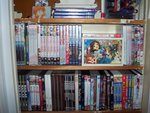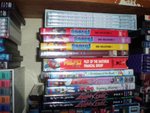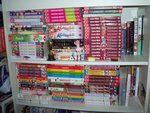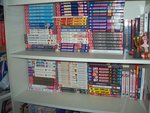Shelf Life
ACROSS the Universe
by Erin Finnegan,

Nothing this week
Rental Shelf
Excel Saga Complete Series DVD
Ga-Rei Zero Complete Series BD+DVD
Coffee Samurai / Hoshizora Kiseki DVD
Perishable
Nothing this week
In fact, this week's Shelf Life is all about love: Excel's unrequited love for Lord Il Palazzo, the sisterly love between two chicks with swords, and some Korean girl's love for an animated vending machine. In the words of Matt Groening, "Love is a snowmobile racing across the tundra and then suddenly it flips over, pinning you underneath. At night, the ice weasels come."
Bad news, Excel; Lord Il Palazzo's just not that into you.
 Back in the early 2000s, Excel Saga was a fan favorite. Recently, I've been reading the manga series in and around New York City, and no less than two total strangers have asked what I was reading (this never happens to me). Neither had ever heard of Excel Saga. One asked what it was about and I stumbled, “Uh… It's… a comedy?”
Back in the early 2000s, Excel Saga was a fan favorite. Recently, I've been reading the manga series in and around New York City, and no less than two total strangers have asked what I was reading (this never happens to me). Neither had ever heard of Excel Saga. One asked what it was about and I stumbled, “Uh… It's… a comedy?”Excel is one of two employees of ACROSS, a secret underground organization trying to take over the world, starting small, with F City. ACROSS is led by a one Lord Il Palazzo, a bishonen dude with a cape, who appears to be a charismatic leader, at least in Excel's eyes. Jason Douglas does a bang-up job as Il Palazzo in the dub, capturing just the right megalomaniacal narcissistic tone. Excel is shortly joined by Hyatt, a serious hemophiliac with the curious habit of perpetually dying and coming back to life.
At the beginning of each episode, the manga creator, Rikdo Koshi, (looking exactly as he does in the manga) grants permission for the anime to parody a different media genre (occasionally Koshi is coerced). B-action movies are lampooned, along with sports anime (bowling), romantic comedies, horror movies, and so on. The real tour de force is episode 22, when the show parodies all manner of space sagas including (but not limited to) Captain Harlock, Starblazers, and classic Gundam all at the same time.
Even though I own the Excel Saga Imperfect Collection, I'm hesitant to recommend the series to anyone. Six months ago, I even hesitated to loan it to a friend who wanted to borrow it. It's too weird… too extreme… too annoying (I'll get back to the annoying part). I don't expect most people to think it's funny. I've justified the purchase by re-watching the (extreme) last episode several times in the last five years.
Nowadays, listening to Jessica Calvello voicing the ever-energetic Excel is painful. It's painful not just because Excel is so obnoxious, it's painful to know that Calvello injured her vocal chords doing the role and had to be replaced after episode 13 by Larissa Wolcott. Regardless of the foreknowledge, Excel's non-stop incoherent prattle is annoying if you watch more than one episode in a row. Come to think of it, this series is like eating Twinkies. They're good-bad (perhaps heta-uma?), but it's inadvisable to eat more than two Twinkies in a sitting. That said, I'll never get tired of the opening sequence, which is one of my top five (maybe top three) favorite anime openers of all time. (The song alone isn't that great, so I have to specify the opening sequence.)
On this re-watch I found it astonishing that Excel Saga was granted a whopping 26 episodes. Indeed, reading the manga, I'm floored that the series is supposedly slated for 25 volumes. Some higher-ups must truly love Koshi. After extensive Excel Saga research over the years, I have come to the conclusion that I am a fan of Shinichi Watanabe, a.k.a. Nabeshin, and not a fan of Koshi. I'm reading the manga primarily because I'm a fan of Dark Horse editor (then at Viz Media) Carl Gustav Horn's excellent footnotes.
The best parts of the Excel Saga anime aren't even from the manga. My two favorite characters are The Will of the Cosmos (made manifest as a beach ball sized floating universe with human arms), and Pedro, the ever-suffering immigrant whose tragic tale is oddly compelling, so much so that a flashback episode towards the end focusing solely on Pedro is far easier to watch than the rest of the series).
Several of Excel's neighbors make up a team of civil servants working for Kabapu, a mustachioed bureaucrat determined to save the city. I always thought their scenes were boring, but reading the manga adds a lot of depth to their characters (I always suspected it would).
This thinpack has a lot of interview extras, including some about Excel Saga's spin-off, Puni Puni Poemi, which is odd because Puni Puni Poemi isn't part of the set. Sadly the "ad vid-notesTM" feature, which explains many of the jokes, is entirely missing from this release.
Of course, if I saw Excel Saga on someone else's shelf, I wouldn't look down on them for having questionable tastes, even as I question my own. And I'd still respect you if you owned Ga-Rei-Zero. I mean, it's an OK show…[TOP]
 “We always kill the ones we love, the ones we shouldn't kill at all.” – The DM of my last Dungeons & Dragons campaign.
“We always kill the ones we love, the ones we shouldn't kill at all.” – The DM of my last Dungeons & Dragons campaign. The first two episodes of Ga-Rei-Zero present a fun high-budget action show that the remaining 10 episodes can't keep up with.
Japan, as we all know from watching a lot of anime, is sometimes prone to attack by horrible invisible spirit beasts and other supernatural evil forces. That's why Buddhist (and/or Shinto) priests have to keep careful track of the country's spirit energy and form secret quasi-governmental fighting teams to keep the country safe.
Middle school girl Kagura's dad fights the forces of darkness with a bound spirit animal whom Kagura will someday inherit. After her mom dies in battle, Kagura is sent to live with Yomi, the adopted daughter of another ghost busting clan, the Isayamas. Yomi is a skilled fighter, and Kagura starts fighting demons along side Yomi as a part time job. It's all fun and games until monsters start killing people they know from school.
But the show doesn't start off that fun; it's serious business until episode four, which has Pocky eating and nipples and girls kissing and stuff. Prior to that, Ga-Rei-Zero starts at the end, with a tragic battle against a super soldier gone rogue. Then we work our way backwards to all the events leading up to the big heart-wrenching final fight.
I wouldn't call Ga-Rei-Zero angsty, per se, but a lot of effort is made for Yomi and Kagura to feel bad about the people they have to fight. I know authors are supposed to torture their characters and kill their darlings, but Ga-Rei-Zero just doesn't fulfill the old axioms in a memorable way.
In fact, Ga-Rei-Zero falls just short of the mark in every department. The action is good, but nothing I'll remember later. The plot is engaging without being engrossing. It's amusing but not amazing. It's a watch-it-once kind of show.
This show in particular suffers heavily from what I've come to call "Shonen Jump Resurrection Syndrome". Many characters receive fatal looking blows, yet manage to survive. This syndrome runs rampant in One Piece, but at least in Ga-Rei-Zero some of the characters do actually die.
I'm in favor of this sort of Blu-ray/DVD combo pack, which eliminates the anxiety of choosing between formats. The CG monsters certainly blend in with the 2D animation more seamlessly on the BD. (There aren't that many 3D monsters, and some of them look amusingly like brontosauruses.)
The dub script has been deftly adapted and naturalized by the hardworking chaps and lasses at Funimation, so much so that it's farther off the subtitle script than most shows. I'm starting to wish they also included a dub script closed-captioning option. The dub itself is quite watchable, but no one performance leapt out at me.
The extras include an excessive amount of footage of the crew “location scouting.” Apparently each action scene was painstakingly researched and choreographed over real locations. It's a little sad to watch these extras after the fact, because the crew visits some amazing real life locations, and although they've carefully reproduced each setting, none of the art truly captures the grandeur of the real places. I ended up wishing I'd visited the Oya Stone Museum instead of watching Ga-Rei-Zero (your mileage may vary).
But maybe I'm not being fair. If you like action, Ga-Rei-Zero is probably right up your alley. It falls somewhere between Corpse Princess and Blood: The Last Vampire on a scale of quality (OK, the CG is better than Blood). I myself was once more enamored of girls in sailor fuku wielding swords, maybe past me would've liked this show more.
If you have an extensive anime collection, I could see owning this. Ga-Rei-Zero would make an excellent non-regrettable bargain bin purchase. As would our next title, the Coffee Samurai and Hoshizora Kiseki double feature.[TOP]
 I think if you pay $2 for this, or perhaps under $5, you'll get your money's worth. Otherwise, Coffee Samurai is a cute one-time viewing experience and Hoshizora Kiseki is… well… dead weight bringing down Coffee Samurai. Unless you love any anime featuring planetariums (in which case you need to watch Sora no Manimani). These two short films weigh in at just one hour.
I think if you pay $2 for this, or perhaps under $5, you'll get your money's worth. Otherwise, Coffee Samurai is a cute one-time viewing experience and Hoshizora Kiseki is… well… dead weight bringing down Coffee Samurai. Unless you love any anime featuring planetariums (in which case you need to watch Sora no Manimani). These two short films weigh in at just one hour.Surprisingly, Coffee Samurai is a Korean short film, (leading me to read a Wikipedia article about the Korean word for samurai). It's split equally between a fun martial arts story and a romantic comedy. Jin Youn-Young is a warrior reborn as a coffee vending machine after wishing for a metal body in his next life. Jin discovers that he can become human for a little while each day, and/or walk around in vending machine form. Before long, he falls in love with a girl.
It so happens I've been to Korea, and while there, I fell in love with the abundant coffee vending machines, which dispense about 3 ounces of instant coffee into Dixie-sized cups for around 50 cents. Normally I'm not that into instant coffee, but I couldn't get enough of this stuff. What I'm trying to say is, basically this short had me from “hello”.
The animation has a children's storybook cute look to it, and still manages to work in well-made sword fights. There's even an adorable Totoro parody at one point. Coffee Samurai is perfect fodder for international animation festivals. It's fun for all ages, subtitled in English, and the violence is bloodless. Chang Hyung-Yun's earlier film festival hit, "Wolf Daddy," has the same adorable art style.
Hoshizora Kiseki is also well-made, but unlike the Korean short, which ends in a satisfactory way, Hoshizora Kiseki's script writer flubs the ending completely.
Kozue has liked planetariums ever since a meteorite landed in her back yard. In fact, she still wears a fragment of it on a bracelet… and it talks to her in her sleep, telling her where more meteorites will land. Thanks to her bracelet, Kozue meets Ginga, a kid her age in a space suit. Is Ginga a bubble boy, an alien or the boy of her dreams?
To Hoshizora Kiseki's credit, I did like the set up; Kozue plans a class trip to exactly where a meteorite is set to land, and her classmates all flake out on her trip at the last minute. She makes the trek to the mountain all alone, hitching a ride with her bike. That is simultaneously sad and the start of a good adventure for a junior high student. The promising set-up and my high sci-fi expectations left me feeling more let down than I might've been with no expectations at all.
Kozue laments in one scene that she's always wanted to work part time in a planetarium. Why the heck hasn't she? Is it because she's crazy? Is this explained in some manga I haven't read? It'd make more sense plot-wise if she had worked in a planetarium. That line struck me as weak writing.
As a fan of space and science fiction and planetariums and stuff, I was sorely disappointed by Hoshizora Kiseki. The brief ONA at first appears to be building to a Close Encounters of the Third Kind ending, but it winds up even more disappointing than Contact (oh burn! I know a lot of people like that movie/book, but I'm siding with Mr. Garrison on that one).
The package boasts that Hoshizora Kiseki is from the studio that brought you The Place Promised in Our Early Days. Sure enough, many of the backgrounds are very pretty, in the style of Makoto Shinkai. Unfortunately, it's totally missing Shinkai's auteur touch.
There aren't any extras, and Coffee Samurai / Hoshizora Kiseki is sub-only. [TOP]
Hey, Shinkai is a guest at Otakon this year! How exciting is that? Actually, I only like Voices of a Distant Star. I thought The Place Promised in Our Early Days was too drawn out and mope-y, and 5 Centimeters Per Second had a tad too much teen angst for someone my age. I respect Shinkai's background painting methods, but I kinda wish someone else was writing his scripts. If you disagree with me on this, maybe we can argue it out in person at Otakon.
Next week I'll be taking a look at more K-ON!, on Blu-ray this time.

In a column earlier this year, I mentioned talking to a cat-eared stranger at Genericon, and he later sent me photos of his shelves!
"Hello, Erin!
It's me, the "mysterious cat-eared stranger" from Genericon! I was so surprised to read your column after Genericon. It was amazing to meet you. I have been into anime for a few years now, and I have amassed quite a DVD and manga collection over that time. I even had to double-layer my manga shelf, as shown.
Aside from two of them, all the manga is in English. I have a lot of out-of-print manga, like all 14 volumes of Love Hina or the first four World of Narue's. I'm pretty proud of it all, so I decided to finally show the world!
P.S.- To prove I'm who I say I am, I included a picture of my cat ears with my conbook. "







Thanks for the pics!
Want to show off your shelves? Send your jpgs to [email protected]. Thanks!
discuss this in the forum (42 posts) |